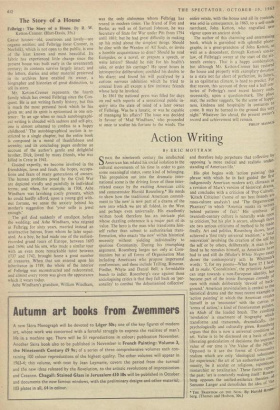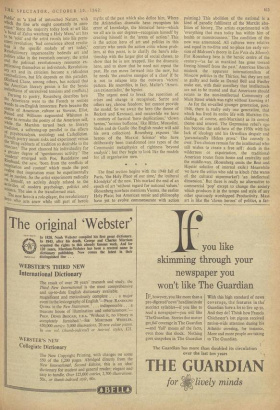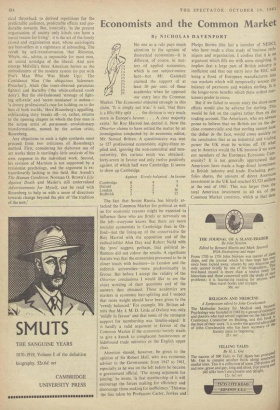Action Writing
By ERIC MOTTRAM
SINCE the nineteenth century the intellectual American has related his social isolation to the cultural movements of his time in order to gain some meaningful status, some kind of belonging. This propulsion out into the dramatic inter- national scene is the driving force of these inter- related essays by the exciting American critic and commentator Harold Rosenberg.* He needs to show how the traditional American commit- ment to 'the new' is now part of a drama of the new into which we are all folded, in the West and perhaps even universally. His excellently written book therefore has an intricate plot whose dazzling coherence is a major part of its value. The hero is the man who transforms him- self rather than submit to authoritarian trans- formation, who enacts 'the new' within historical necessity without yielding individuality to spurious Community. During his triumphing argument, Rosenberg hinges not only at Com- munism but at all forms of Organisation Man including Americans who propose impersonal conformism; and these include Trilling, Riesman, Fiedler, Whyte and Daniel Bell, a formidable bunch to indict. Rosenberg's case against these sociologising critics is that they fall back on 'per- sonality' to combat 'the dehumanised collective' and therefore help perpetuate that collective by opposing 'a more radical and realistic under- standing of American life.'
His plot begins with 'action painting' Os phrase with which he in fact guided the first indigenously American modern art), climaxes 10 a revision of Marx's version of historical drama", and concludes with a criticism of 'Pop Culture, `Kitsch Criticism' (`some of my best friends are mass-culture analysts') and 'The Orgamericaa Phantasy' in which 'America masks its terrors behind patterns of fact.' His synthesis of twentieth-century culture is naturally wide open to criticism, but his plot is secure, although the are two serious criticisms of method to be made finally. Art and politics, Rosenberg shows, have achieved a 'first truly universal tradition,' a 'total renovation' involving the creation of the self by the self or by others, deliberately. A man is de' fined as he remakes himself, as Americans have had to and still do (Mailer's White Negro essay shows the contemporary act). In Whitman s words: 'I, for my poems—What have I? I have all to make. 'Coonskinism', the primitive Ameri- can urge towards a non-European identity, has become part of the ironic European comedy 01 men with minds deliberately 'devoid of back- ground.' American provincialism is central to the historical drama and the most recent example Is `action painting' in which the American creates himself in an 'encounter' with the canvas as `arena of action,' a kind of frontiersman painter, an Ahab of the loaded brush. The resulting `revelation' is enactment of biography which „ transforms and transcends, dramatically, the psychologically and culturally given. Rosenberg argues that this is now a universal condition of art. Value is to be discussed on a basis of tilts liberating gesticulation of decisions; the supreale, value of our time is 'the Value of the NEW • Opposed to it are the forms of Community realism which are only 'ideological substitutes for experience,' the art of 'an authoritarian cony munity, be it secular or religious, republican, monarchist or totalitarian.' These forms repeatthe past; 'art is constantly making itself.' Rosen; berg opposes the unified-esthetics theories, r- Suzanne Langer and demolishes the idea of the * THE TRADITION OF THE NEW. By Harold Rosen- berg. (Thames and Hudson, 30s.)
Public' as 'a kind of untouched Nature, with which the fine arts ought constantly to corn- Since the majority today look at art like
a band of Zulus watching a Holy Mass,' art has to be
`sold' and the artist recoils into his perm-
anent revolution; 'bad conscience about revolt': lion is the specific malady of art today.' Revolutionary impersonality bedevils art and Politics alike in the twentieth century; the artist atId. the political revolutionary renounce ex- Persencing themselves as individuals. Revolution- ary art and its criticism become a ridiculous contradiction, but life depends on this paradox. (Richard Chase, among others, has noticed that the American literary genius is for the heroic melodrama of unresolved tensions and conflicts.) Turning to poetry, Rosenberg describes how the Americans went to the French to restore Words to un-English innocence. Paris became the centre of American culture as Stevens, Eliot, Pound and Williams augmented Whitman in order to remake the poetry of the American self, W. tide the Marxists turned back to literary tradition, a softening-up parallel to the effects re't psychoanalysis, sociology and Catholicism. ,,rerl,eh poetry meant risks and experiment versus Yie filing cabinets of tradition so desirable to the Insecure: The poet chanced his individuality for a greater degree of 'spontaneous activity.' The Rimbaud, emerged with Poe, Baudelaire and irnhaud, the new. 'born from the conflicts of inspiration and content' which made the poet real!se that inspiration must be experimentally set in motion. So the artist experiments radically °11. himself, an activity deeply related to the activities of modern psychology, politics and science. The aim is the transformed man.
, The new hero is a role-player, the revolutionary "ero who acts anew while still part of heroic myths of the past which also define him. Where the Aristotelian dramatic hero recognises his error of knowledge, the historical hero—which we all are in our degrees—recognises himself by creating himself in the `arena of action.' This is the action hero of art and politics in this century who needs the action critic whose prob- lem, at this point, is to clarify the hero's rela- tionship with the larger plot of social classes, to show that he is not trapped, like the dramatic hero, and to show that he need not repeat the past. He can move forward into the new, but he needs 'the creative energies of a class' if he is not to relapse into the outworn 'victim' pattern. He resembles, in fact, Mailer's 'Ameri- can existentialist,' the hipster.
The urgent need to break the repetition of crises and change is recognised; Sartre and others say, choose freedom; but cannot provide the model. So we await the hero (the theme of Beckett and Kerouac), and meanwhile we have a century of farcical 'hero duplications,' clown heroes,' serious buffoons,' like Hitler, Mussolini, Stalin and de Gaulle (the English reader will add his own collection). Rosenberg exposes 'the heroes of the Marxist Science' who have deliberately been transformed into types of the Communist metaphysics of rightness 'beyond analysis': but they begin to look like the models for all organisation men.
*
The final section begins with the 1940 fall of Paris, 'the Holy Place of our time,' the 'cultural Klondyke' of the new. This marked the end of an epoch of art 'without regard for national values.' (Rosenberg nowhere mentions Vienna, the earlier Holy Place; but American music and philosophy have yet to evolve commensurate with action painting.) This abolition of the national is a kind of parodic fulfilment of the Marxist abo- lition of history, The artists experimented with `everything that man today has within him of health or monstrousness.' The condition of the new was announced. All cultures were relative and equal in no-time and no-place (an early ver- sion of Malraux's theory in Les Voix du Silence). For Rosenberg here is the heroic centre of the century—'as far as mankind has gone toward freeing himself from the past.' American liberals mistook the apparent internationalism of Moscow politics in the Thirties, but they are not as guilty and futile as Daniel Bell and Fiedler make out, with their corollary that intellectuals are not to be trusted and that Americans should return to the non-intellectual Community of Main Street which was right without knowing it!
As for the so-called younger generation, post- 1946, there is really only one generation, that which has lived its entire life with Marxism (in- cluding, of course, anti-Marxism) as its central theme and interest. The Depression rebel's ego has become the anti-hero of the 1950s with his lack of ideology and his Orwellian despair and `paranoiacally lifeless prose.' The comedy is over. Two choices remain for the intellectual who still wishes to create a free self : death in the wilderness or expatriation, the traditional American routes from home and centrality and the middle-way. (Rosenberg omits the Beat and Hipster solution of internal exile.) Meanwhile we have the critics who add to kitsch (`the wares of the cultural supermarket') 'an intellectual dimension.' But there is really no alternative to commercial 'pop' except to change the society which produces it in the tempo and style of any other spuriously worshipped Productivity. Mass art is like the 'clown heroes' of politics, a far-
cical throwback to derived repetitions for the predictable audience, predictable effects and pre- dictable rewards. But, ironically, 'in the present organisation of society only kitsch can have a social reason for living': it is the art of the lonely crowd and organisation man, whose sociologists are best-sellers in a nightmare of inbreeding. The revolt by self-transformation that Riesman, Whyte, etc., advise, is impossible for most men, an unreal nostalgia of the liberal. And now emerge Melville's three American heroes as the embodiments of the modern system (to put with Poe's Man Who Was Made Up): The Confidence Man (the ubiquitous Salesman- Preacher'), Ahab (the inner-directed paranoiac lighter) and Bartelby ("the white-collared tomb deity'). But the old-fashioned 'strategy of fight- ing self-exile' and 'secret resistance' is useless— 'a dreary professional's ruse for holding on to the best of both worlds.' Here Rosenberg's appalling, exhilarating story breaks off--or, rather, returns to the opening chapter in which the free man is the action artist of permanent revolutionary transformations, named by the action critic, Rosenberg.
Any objections to such a tight synthesis must proceed from two criticisms of Rosenberg's method. First, considering his elaborate use of art works there is startlingly little analysis of his own response to the individual work. Second, his revision of Marxism is not supported by a revisionist psychology, and the argument is ex- traordinarily lacking in this field. But Arendt's The Human Condition, Norman O. Brown's Life Against Death and Mailer's still undervalued Advertisements for Myself, can be read with Rosenberg to help us with a sense of directions towards change beyond the plot of 'the tradition of the new.'
















































 Previous page
Previous page